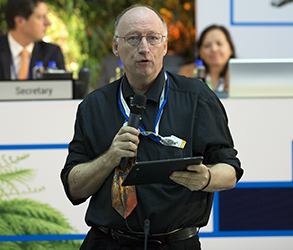Multi-Stakeholder Dialogue “People and Pollution” at United Nations Environment Assembly 3
 |
| Photo by IISD/ENB Mike Mururakis |
There were two sessions the first looking at the impact on pollution and the second on how we might address the problems.
Opening tDialoguegue was Ambassador Marie Chatar-dová the President of EcoSoc. She was followed by three presentations:
- Olga Speranskaya, the CoChair of IPEN (International POPs Elimination Network), a global network of non-governmental organisations working towards a toxic-free future where she has focused on the design and implementation of IPEN global strategy to address pollution sources, domestic and international chemical safety policies and processes

Photo by IISD/ENB Mike Mururakis - Halima Hussein, a Kenyan lawyer working with Natural Justice: Lawyers for Communities and the Environment. She supports marginalized communities obtain fairer environmental decisions by empowering them to use the law and thereby mitigate the impacts of extractive and infrastructure projects affecting their culture, land, and environment
- Ms Molewa, South African Minister Water and Environment
- Dr Lin LI Director, of Global Policy & Advocacy WWF International
- Jane Patton, Plastic Pollution Coalition
- Mr Kiisler Estonia, Minister of the Environment,
The second session had the following two presentations:
 |
| Photo by IISD/ENB Mike Mururakis |
- Eritai Kateibwi, a Young Champions of the Earth for Asia Pacific In January 2017, he organized a major beach clean-up on Betio Red Beach historical site
- Kaya Dorey, the founder of NOVEL SUPPLY CO. a sustainable apparel line made in She is also a Young Champion of the Earth, and is striving to create a zero waste, closed-loop model that takes responsibility for the products she creates.
Responding were:
- Minister Tiilikainen, Finland’s Minister for the Environment, Energy, and Housing,
- Minister Alexander Teabo, Kiribati's Minister for Environment, lands, and AgricultuDevelopmentent
- Minister Helgesen, Norway's Minister of Climate and the Environment
- Minister Schauvliege, Flemish Minister for Environment Nature and Agriculture and nrg4SD Co-Chair for the North
The meeting opened to further comments on what was said and what was missing from:
- Minister Ms Skog, Sweden'ss Minister for the Environment
- Ms. Vijoleta Gordeljevic Health and Climate Change Coordinator Health and Environment Alliance (HEAL)
- Marc D’Iorio, Ph.D. Canada Director General Industrial Sectors, Chemicals, and Waste at Environment and Climate
- Nick Palombo International Chamber of Commerce
- Jane Nishida, Principal Deputy Assistant Administrator for EPA's Office of International and Tribal Affairs (OITA)
- Sarah Nelson Birdlife International and Head of International Policy at RSPB
- Leida Rijnhout Friends of The Earth Europe and the co-coordinator of the NGO Major Group
The dialogue focused on root causes for different aspects of pollution, including making the connections to poverty, rule of law, women’s rights and human rights. Respondents included Ministers and different stakeholders.
Pollution is in everything we do: it is in what we eat, it is in the air we breathe, the water we drink. Pollution is not just an environmental problem but a social, economic and health challenge. Implications of pollution affect people all around the world. But specifically, the poorest and most vulnerable people suffer the most – the poor, women and children.Therefore, tackling pollution contributes to all dimensions of sustainable development by fighting poverty, improving health, creating decent jobs and protecting our natural resources and biodiversity.
Messages from the dialogue for you to consider:
- The implementation of global agreements is critical.
- There is a need for multi-stakeholder and multi-level collaboration
- Member states need to further develop mechanisms to enhance coherence and efficiency.
- Too often laws are ignored in countries – increased capacity support is needed in many developing countries to support the implementation of national laws.
- Governments can do a lot more to incentivize sustainability as for example the carbon tax.
- They can put out recycling targets and have innovation schemes.
- Green public procurements need to be expanded at all levels of government
- Circular economy is important approach we need to take out the chemicals
- Data and monitoring underpins all approaches to addressing pollution and should be at the core of multi-level partnerships.
- Building public awareness of the problem will mobilize political will
- Voluntary commitments are a good first stage. But it is not enough. More regulation is needed at the international and national level.
- Extended producer responsibility should be built in to all products
- We need to make sustainable products more affordable with government incentives
- Clean industry and other stakeholders should work together in Multi Stakeholder partnerships to promote innovative solutions and help build local capacity to address pollution.
- Addressing corruption in public and private sectors will underpin all approaches to addressing pollution.
- UNEA more clearly needs to input to the HLPF – this should include UNEA 4 addressing the environmental contribution to the Heads of State HLPF in 2019



Comments
Post a Comment